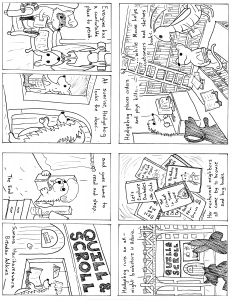My friend Sumana is pretty spry for a retired newspaper columnist. For years she was MC Masala, syndicated in several papers all over the SF Bay, even after she had left it for the other side of the country. I loved the column and read every installment, and I was delighted to see that she recently resurrected its archives on her personal site, nearly a decade after she began that phase of her career. (As befits her growing skillset and shifting direction, she wrote the CMS for it herself!)
From the beginning, the column showed off her skill (and taste) in comedy, cosmopolitan interest in religion, and clever use of parables from both ancient texts and her own life. I still use this aphorism about books and sandwiches to remind myself how to engage with people at social gatherings. I stole quite a few ideas for tiny stories from her, sometimes immediately, sometimes much later; she delivered insights about the nature of attachment that would influence me for years to come.
Over its run, she let her readers in on landmarks in her life in a friendly, almost conspiratorial way: her move from San Francisco to New York, the concurrent shift from one career to another, her wedding—and even personal connections to events on a larger scale, like the end of glasnost.
She was way ahead of the curve, of course, on relaxing vice laws and marriage equality. She showed up early to the fight against manspreading (and manxiety). She preceded me in getting over Aaron Sorkin, and I took way, way too long to come around to her Brian K. Vaughn fandom. And she made some predictions about herself that were wrong in amazing ways: she does, in fact, now give many thousands of dollars to charity, and one branch of her current unpaid public service uses skills she is still developing, and increasing all the time.
Reading back through these, I felt smug and flattered all over again that I got to make a subtle appearance here and there.
Her final column makes me well up with feeling. I first started following Sumana’s blog sometime in 2001, so right now it falls around the halfway mark in the timeline of our friendship. It’s only gained more meaning to me since the first time I read it—I’d never even listened to the Mountain Goats back then!* To this day, she posts regular entries stuffed with insights and links to explore, whereas I didn’t write a damn thing here for all of 2014. I am so fortunate that I was able to make a connection with her back then, and to have followed her with aspiration ever since.
It’s been almost nine years, Sumana; where are you from now?
I shouted, “Congratulations!” She responded, fist raised, “Perseverance!”



